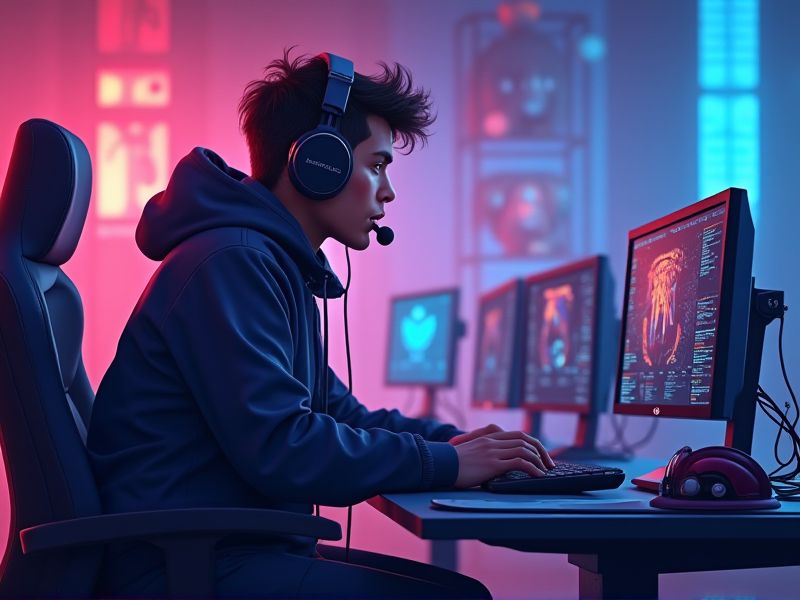
While there isn't a specific quote from a famous person directly related to improving at FPS games, a common piece of advice is to focus on consistent practice and understanding the mechanics of the game. This includes mastering movement, aiming, and map awareness. Professional gamers often emphasize the importance of analyzing gameplay, learning from mistakes, and staying calm under pressure. By adopting these strategies, players can significantly improve their skills in FPS games.
How to Be Better at FPS Games
Precision Aim Drills
Precision aim drills improve muscle memory and reinforce consistent crosshair placement, which directly enhances your reaction time during fast-paced engagements. Regular drill practice establishes neural pathways that link visual input to precise motor actions, enabling quicker target acquisition. Focused exercises such as flick shots and tracking moving targets simulate in-game scenarios and facilitate rapid adjustments. Consistent repetition with measurable benchmarks also builds confidence and transfers directly to increased accuracy in competitive settings.
Optimal Crosshair Placement
Optimal crosshair placement focuses on keeping your aim at head level as you navigate common engagement zones. Consistently positioning your crosshair on likely enemy approach areas minimizes movement adjustments during sudden encounters. Focusing on pre-aiming and tracking practice drills can concretely improve reaction times and accuracy. Data shows that players with stable crosshair placement tend to secure more headshots, which directly correlates with higher kill-death ratios.
Fluid Movement & Positioning
Enhancing fluid movement begins with practicing controlled transitions and decelerations to evade enemy targeting while consistently maintaining situational awareness. Optimizing positioning involves mastering the dynamics of the map layout and understanding enemy tendencies to secure advantageous firing angles. Rapid, deliberate adjustments in movement facilitate quicker escapes and strategic counter-attacks, yielding noticeable improvements in reaction time during heated encounters. Data-driven training--such as tracking positional statistics and refining sensitivity settings--directly correlates with improved fluidity and robust positioning in competitive FPS gameplay.
Map & Environment Mastery
Thorough map knowledge boosts strategic positioning by exposing high-traffic paths and potential ambush zones. Recognizing chokepoints, vantage spots, and hidden corridors enhances your anticipation of enemy movement. Constantly analyzing environmental details sharpens decision-making during fast-paced encounters. Harnessing this information creates a direct cause for improved reaction times and increased in-game advantage.
Weapon-Specific Proficiency
Focus on mastering the unique mechanics of each weapon by understanding its recoil pattern, fire rate, and damage output through targeted practice sessions. Allocate dedicated time to fine-tuning your aim within training modes, using in-game data and statistics to track your precision and response times. Embrace iterative learning by analyzing your match recordings to identify recurring issues and adjust your playstyle accordingly for each weapon type. Leverage weapon-specific drills to bridge the gap between theoretical knowledge and practical application, ultimately enhancing your performance across diverse combat scenarios.
Tactical Decision-Making
FPS games demand rapid, analytical tactical decision-making to assess risk and exploit enemy positioning in real time. Developing a keen awareness of in-game cues, such as enemy movement patterns and map control dynamics, enables you to prioritize objectives and choose high-impact engagement points. Consistent practice and data analysis--reviewing replays to understand decision outcomes--refine your ability to make split-second, high-value choices. Emphasizing a balanced approach that combines instinctive reactions with strategic planning produces a measurable improvement in overall performance.
Effective Team Communication
Effective team communication enables precise callouts and tactical coordination that directly improve in-game decision-making. Sharing information such as enemy positions, health statuses, and resource availability in real time significantly boosts a team's ability to adapt to dynamic situations. Utilizing concise language and standardized terms minimizes misunderstandings and ensures every teammate understands their role in executing strategies. This clarity in communication consistently leads to higher win rates as it fosters coordinated efforts and rapid responses to emerging threats.
Strategic Adaptability
Strategic adaptability starts with understanding the map layout and anticipating areas of conflict so you can reposition quickly. Observing enemy behavior and dynamically altering your tactics allows you to preempt their strategies and capitalize on weaknesses. Constantly evolving your approach--whether by switching weapons or adjusting movement patterns--creates uncertainty for your opponents. Analyzing match outcomes and incorporating data-driven adjustments strengthens your gameplay and progressively fine-tunes your adaptability in fast-paced encounters.
Situational Awareness
In FPS games, situational awareness is sharpened by consistently scanning the environment for movement and auditory cues, which helps you preempt enemy actions. Attentively monitoring your mini-map and remnant animations creates a stronger connection between observed signals and enemy positions. Enhanced awareness leads to faster reaction times, as your brain develops a habit built on accountability and reliable data. Training your peripheral vision through dedicated practice sessions and review of game footage can further transform raw reaction into strategic gameplay advantage.
Mental Resilience & Consistent Practice
Building mental resilience in FPS games means adopting a mindset that embraces mistakes as learning opportunities, helping you remain focused during high-pressure moments. Consistent practice refines your aiming, movement, and strategic decision-making through the development of muscle memory. Regular training sessions, similar to real-world drills, allow you to systematically address weaknesses and adapt to evolving gameplay challenges. Combining mental toughness with a dedicated practice routine directly enhances in-game performance by ensuring faster reactions and clearer strategic thinking.
Summary
Precision aim drills refine the underlying mechanics, boosting accuracy and reaction times during critical engagements. Optimal crosshair placement minimizes adjustment delays by aligning targeting points with anticipated opponent locations. Fluid movement and positioning reinforce aggressive yet controlled gameplay, creating tactical advantages in dynamic encounters. Data consistently shows that integrating these techniques enhances overall performance and strategic adaptability in competitive FPS environments.
